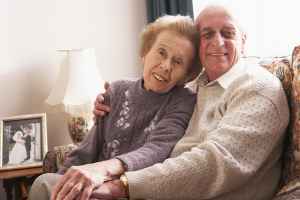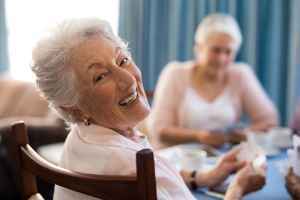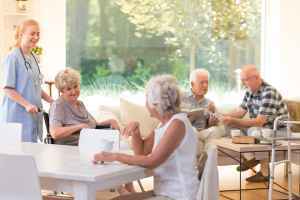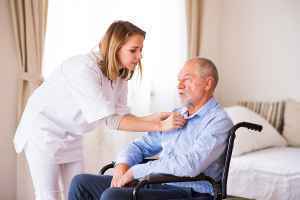Memory Care in Maryland
According to the National Center for Assisted Living, more than 50% of Maryland seniors who live in licensed residential care facilities have Alzheimer's disease or dementia. By 2025, the Alzheimer's Association estimates that age-related memory loss will affect 130,000 older adults statewide.
Alzheimer's patients have complex emotional and physical needs that require daily supervision as well as increased medical care. Individuals who are unable to receive this level of support at home often turn to dedicated memory care communities that are better equipped to handle their needs through recreational activities, therapeutic services and specialized staffing. Data from Genworth Financial shows that the average cost of memory care in the state is $5,375, which is slightly higher than the national average.
This guide includes detailed information to help Maryland families estimate their potential costs, locate financial assistance programs and access memory care resources in their community.
SeniorAdvice's Guide to Memory Care in Maryland
Developed by SeniorAdvice, SeniorScore is the nation's first livability index created just for older adults. It ranks states and communities based on the cost of living, climate, health care system, crime rate and overall quality of life. According to this ranking system, Maryland has a SeniorScore of 75, which is three points higher than the national average. The state performs best for Health & Safety and Finances.
Maryland seniors benefit from an excellent health care system that includes a high number of hospitals, doctors and home health providers. However, considerable crime ratings capped the state's Health & Safety score at 68. Cost of living is an important consideration for retirees and anyone living on a fixed income. Maryland residents earn significantly more than the average American, but they also pay more for long-term care and everyday essentials. Moderate property and sales tax rates contributed to the state's Finances score of 67.
Ratings for General Quality of Life and Recreation & Leisure are tied at 65 points. These metrics consider the state's climate and typical environment as well as the availability of recreational opportunities. Overall, the Old Line State has an average population and a moderate Mid-Atlantic climate, with a median daily temperature of 54.7 degrees. Senior citizens, who represent nearly 30% of the population, have access to an average number of parks as well as 170 golf courses and nearly 3,000 churches.
Top Memory Care Communities in Maryland
Located at 9701 Veirs Dr in Rockville, Maryland, The Village at Rockville is a 150 bed senior care community. The surrounding area has a dense population, with roughly 47,000 individuals living in the zip code of 20850. With ...
FutureCare Irvington is a 200 unit senior community. It is located within the Tremont neighborhood of Baltimore, Maryland. The community is in a mostly middle income area, with an average household income of $41,621. With around 46,000 ...
Hebrew Home of Greater Washington is located at 6121 Montrose Rd in Rockville, Maryland. It is a 558 bed senior care facility. The encompassing area is densely populated, with about 41,000 individuals residing in the zip code of ...
Located around the Redland area of Gaithersburg, Maryland, Wilson Health Care Center is a 288 unit nursing care facility. The neighboring area is densely populated, with roughly 35,000 individuals residing in the 20877 zip code. With a median ...
Spa Creek Center is a 134 room senior community. It is located at 35 Milkshake Ln in Annapolis, Maryland. The encompassing area is heavily populated, with around 31,000 individuals residing in the zip code of 21403. With ...
FutureCare Cherrywood is a 168 bed senior care facility. It is located at 12020 Reisterstown Rd in Reisterstown, Maryland. The community is in a largely upscale area, with an average per-family income of $82,649. With about 35,000 ...
Riderwood Village is a 117 unit senior care facility. It is situated in the Calverton neighborhood of Silver Spring, Maryland. With about 56,000 individuals living in the zip code of 20904, the neighboring area is heavily populated. ...
Heritage Harbour Health and Rehabilitation Center is a 154 bed nursing care facility situated close to the Londontowne neighborhood of Annapolis, Maryland. The community is in a primarily upper class area, with a median family income of $83,902. ...
Located within the Wheaton-Glenmont area of Wheaton, Maryland, ManorCare Health Services - Wheaton is a 94 room skilled nursing facility. The neighboring area is heavily populated, with about 50,000 people residing in the zip code of 20902. With ...
Glen Burnie Health and Rehabilitation Center is a 190 unit skilled nursing facility situated near the Ferndale neighborhood of Glen Burnie, Maryland. The community is in a mostly middle class area, with a median per-family income of $59,495. ...
Situated near the Woodridge area of Riverdale, Maryland, Crescent Cities Center is a 140 unit senior housing facility. The surrounding area is densely populated, with approximately 22,000 poeple living in the 20737 zip code. With an average family ...
ManorCare Health Services - Chevy Chase is located within the Hawthorne area of Chevy Chase, Maryland. It is a 172 bed skilled nursing facility. The facility is in a largely affluent area, with a median household income of ...
ManorCare Health Services - Bethesda is a 110 unit nursing facility situated in Bethesda, Maryland. With an average per-family income of $166,977, the facility is in a primarily well-to-do area. It is heavily populated, with approximately 37,000 individuals ...
Located at 9701 Medical Center Dr in Rockville, Maryland, Shady Grove Center is a 134 room senior housing community. The facility is in a largely upper class area, with an average family income of $105,204. With about 47,000 ...
Waldorf Center is a 115 room senior community located in Waldorf, Maryland. With roughly 26,000 residents in the 20602 zip code, the surrounding area is heavily populated. It is a generally middle income area, with an average ...
Sligo Creek Center is a 102 room senior housing community. It is located in the Takoma neighborhood of Takoma Park, Maryland. With an average household income of $63,830, the facility is in a largely middle income area. ...
FutureCare Chesapeake is a 154 room senior housing facility located in Arnold, Maryland. The encompassing area is densely populated, with approximately 22,000 people residing in the zip code of 21012. With an average family income of $100,952, it ...
Loch Raven Center is located near by the Hampton area of Baltimore, Maryland. It is a 94 room senior care facility. The facility is in a primarily middle income area, with an average per-family income of $59,055. ...
Layhill Center is located in the Rossmoor area of Silver Spring, Maryland. It is a 129 room senior care community. The neighboring area has a dense population, with roughly 66,000 people residing in the zip code of 20906. ...
Collingswood Nursing and Rehabilitation Center is located at 299 Hurley Ave in Rockville, Maryland. It is a 160 room skilled nursing facility. The encompassing area is heavily populated, with around 47,000 residents in the 20850 zip code. ...
The Cost of Memory Care in Maryland
Data focusing on the cost of memory care is limited as this is still an emerging area. However, Maryland residents can expect to pay 20 to 30% more for memory care than assisted living. All pricing estimates are based on responses from Genworth Financial's long-running Cost of Care Survey, which gathers information from more than 14,000 long-term care providers in 440 metropolitan areas. To arrive at estimates for memory care costs, 25% was added to the average assisted living rates.
According to this study, Maryland seniors typically pay $5,375 per month for memory care. While local rates are slightly higher than the U.S. median of $5,064, Maryland is one of the most affordable areas in the Mid-Atlantic region and the Washington, D.C., metropolitan area. Average monthly rates are $484 lower in Pennsylvania, but they're $625 higher in Virginia, $2,169 higher in Delaware and a whopping $8,735 higher in the nation's capital, where seniors pay 2.6 times more for memory care.
- Maryland: $5,375
- United States: $5,064
- Delaware: $7,544
- Pennsylvania: $4,891
- Washington, D.C.: $14,110
- Virginia: $6,000
The Cost of Memory Care in Maryland's Top Cities
With Maryland's large urban centers, thriving suburbs and rural strongholds, memory care costs vary substantially across the state. At $4,688, average rates are lowest in Cumberland, a community that has received national recognition for its affordability. Baltimore and Hagerstown also offer below-average rates of $5,281 and $5,063, respectively. However, average prices rise substantially to the south and the east. On the Eastern Shore, seniors in Salisbury pay $6,588 per month for memory care, and in California, rates are $2,454 higher than the state median, which represents can increase of about 42%.
- Baltimore: $5,281
- Hagerstown: $5,063
- Salisbury: $6,563
- Cumberland: $4,688
- California: $7,829
Senior Care Cost Comparison in Maryland
Seniors who need help with activities of daily living can receive assistance at home, in a community-based setting or in a licensed residential facility. Adult day care is the most affordable option. The average program in Maryland costs about $1,775 per month, which is less than half as much as in-home care. Homemaker services and home health aides cost $4,481 to $4,576 per month, respectively, and seniors are still responsible for housing, utilities, food and other expenses. Families who want all-inclusive care can expect to pay $4,300 for assisted living or $5,375 for memory care. Although dementia care can be costly, it costs $4,298 less than services provided in nursing homes, which can save families over $50,000 per year. Memory care communities also offer a more comfortable, homelike environment with fewer restrictions.
- Memory Care: $5,375
- Assisted Living: $4,300
- In-Home Care: $4,481
- Home Health Care: $4,576
- Adult Day Care: $1,775
- Nursing Home Care: $9,673
Financial Assistance for Memory Care in Maryland
Home- and Community-Based Options Waiver
Address: 201 W. Preston St., Room 136, Baltimore, MD 21201
Phone Number: (844) 627-5465
Website: https://mmcp.health.maryland.gov/longtermcare/Pages/Community-First-Choice.aspx
Formerly known as the Medicaid Waiver for Older Adults, Community Options is a Home- and Community-Based Services waiver sponsored by the Maryland Department of Health. It's available to senior citizens and disabled adults who need help paying for personal care and require a nursing home level of support. This waiver covers the cost of assisted living services, respite care and case management, as well as behavioral health consultations and services provided by a nutritionist or dietitian. Individuals must earn no more than 300% of the federal benefit rate and have limited assets to qualify. Seniors should contact the nearest Maryland Access Point office more information about this program and the application process.
Program of All-Inclusive Care for the Elderly
Address: 4940 Eastern Ave., Baltimore, MD 21224
Phone Number: (410) 550 7047
Website: https://mmcp.health.maryland.gov/waiverprograms/Pages/PACE.aspx
PACE is a groundbreaking integrated care system that has spread across the nation over the past 40 years. Under this model, a single organization provides seniors aged 55 and older with medical care and long-term care. Individuals must require a nursing home level of support and meet financial eligibility criteria to qualify. Additionally, the program allows dual enrollment in Medicare and Medicaid. While some members live in the community and attend daytime health centers, PACE also offers services to individuals residing in memory care facilities. In Maryland, PACE is available through Hopkins ElderPlus. Applicants must live in a designated geographic area, although the program's service area may expand in the future. Individuals can contact Hopkins ElderPlus to determine their eligibility.
Maryland Memory Care Rules and Regulations
The Maryland Department of Health, Office of Health Care Quality licenses residential care facilities through its Assisted Living Unit. This agency develops regulations and oversees facilities to ensure compliance with all state laws.
Scope of Care | Maryland licenses three levels of Assisted Living Programs according to on the types of services they provide and the residents they serve. These facilities may provide assistance with daily activities, medications, household chores and meal preparation. Level 1 facilities are designed for residents who need occasional assistance. Level 2 facilities serve individuals who need more substantial assistance, and Level 3 programs accept residents who need extensive or frequent support, including intensive medical or behavioral services. |
Care Planning | Assisted living facilities must develop individualized care plans that address the resident's physical and cognitive needs. Assessments must be reviewed every six months or after a significant change in health or function. Care plans must be evaluated by a licensed health care provider. |
Dementia Disclosure | Facilities that operate Dementia Special Care Units must prepare a disclosure that details their qualifications, policies and fees. This document should include information about the facility's philosophy, training standards, activities, services, care assessments and admission/discharge policies. |
Medication Management | Trained nursing staff at Level 2 and 3 facilities may administer medications. Level 1 facilities may assist with self-administration. Staff members must also evaluate residents' ability to self-administer medications as part of routine care assessments. |
Staffing | Initial and ongoing training programs must cover emergency procedures, food safety, infection control and job-specific tasks. Individuals who work in a memory care facility or special care unit must complete five hours of state-approved dementia training within 90 days of employment. The state also has continuing education requirements for managers. Background checks are required for all new and current employees. |
Medicaid Coverage | Maryland Medicaid's HCBS Options Waiver can help with the cost of personal care services provided in a Level 2 or Level 3 assisted living facility. Financial assistance is not available for Level 1 services. |
Reporting Abuse | Employees and managers who work in assisted living facilities have 24 hours to report instances of suspected abuse, neglect or exploitation. Reports should be made to Adult Protective Services by contacting the county office or the statewide hotline at (800) 332-6347. Individuals are also encouraged to relay information to law enforcement, the local long-term care ombudsman or the Office of Health Care Quality. |
Free Memory Care Resources in Maryland
Alzheimer's Association Greater Maryland Chapter
The Alzheimer's Association is a single point of contact for a wide range of resources aimed at dementia patients, family members and caregivers. It provides individualized care consultations, hosts more than 75 monthly support groups and operates a 24-hour support hotline that can be reached at (800) 272-3900. It also engages in outreach, sponsors fundraising events and supports Alzheimer's research. Cities in the D.C. metropolitan area are served by the National Capital Area Chapter, and the Greater Maryland Chapter supports residents in surrounding parts of the state.
Hopkins Memory and Alzheimer's Treatment Center
In addition to offering advanced medical care at the Bayview Medical Center, the Johns Hopkins Memory and Alzheimer's Treatment Center provides a variety of free resources for patients and families. The Family Resource Center maintains a large selection of educational materials, and volunteers can direct residents to local resources in their area. The Center hosts monthly Club Memory meetings and a sponsors a podcast featuring neuroscience faculty and caregivers who share their unique insight and experience.
Maryland Agencies
Office of Adult Services
Address: 311 W. Saratoga St., Baltimore, MD 21201
Phone Number: (800) 332-6347
Website: https://dhs.maryland.gov/office-of-adult-services/
This division of the Department of Human Services works to promote the safety and well-being of older adults statewide. It manages the Respite Care Program, which can fund interim services to relieve primary caregivers. The Office of Adult Services manages the state's network of Adult Protective Services offices, which investigate cases of potential abuse occurring in assisted living facilities or in the community. It can also connect residents with counseling, case management, personal supports and related services. Its programs are designed to meet the needs of disabled adults, elderly individuals and other vulnerable populations regardless of income.
Maryland Department of Aging
Address: 301 W. Preston St., Suite 1007, Baltimore, MD 21201
Phone Number: (800) 243 3425
Website: https://aging.maryland.gov/Pages/AboutUsMDOA.aspx
The goal of this state agency is to make Maryland a vibrant, attractive location for older adults. Its programs and services are designed to create healthy aging opportunities, fund supportive services and ensure that citizens are aware of all of their long-term care options. This department oversees the state's Area Agencies on Aging, the Long Term Care Ombudsman Program and the Maryland Commission on Aging, which provides services through county-level offices statewide. These programs can help seniors maintain their independence and lead healthier, longer lives. The Commission on Aging also offers funding for assisted living and supportive housing to individuals who are on waiver waiting lists.
Area Agencies on Aging in Maryland
Maryland is home to seven regional Area Agencies on Aging that serve older adults and caregivers. Staff members at Maryland Access Point offices can help residents identify their needs, understand their options and take advantage of resources to help them age safely and independently in the community. They assist with applications for publicly and privately funded services and provide referrals. AAAs fund local senior centers and offer resources for caregivers. Maryland Access Point also handles Medicaid waivers that cover assisted living and memory care. Seniors can find their local AAA by visiting the Department of Aging online.
Veteran Affairs Offices in Maryland
The Maryland Department of Veterans Affairs has served military families since 1999, and its roots date back to the early 1900s. The agency's primary goal is to connect veterans, service members and dependents with services, benefits and medical care available through the state and federal governments. It engages in outreach, maintains memorial sites and manages the Maryland Veterans Trust, which funds local projects statewide. Service members can also access long-term care through the Charlotte Hall Veterans Home, which is funded by the department. Individuals can locate their local MDVA office online to learn more about Aid & Attendance benefits and other programs that can help with the cost of memory care.
Social Security Offices in Maryland
The Social Security Administration provides a number of benefits to support older adults, disabled individuals and other vulnerable populations. Staff members at local SSA field offices can help residents apply for benefits, appeal application decisions and manage their account. In addition to providing retirement and disability benefits, this agency offers Supplemental Security Income that can help offset the cost of room and board at a qualifying memory care facility. To learn more about these programs or to schedule an appointment, individuals can find their local SSA office online.
Other Cities in Maryland






















 Your Information is Processing
Your Information is Processing